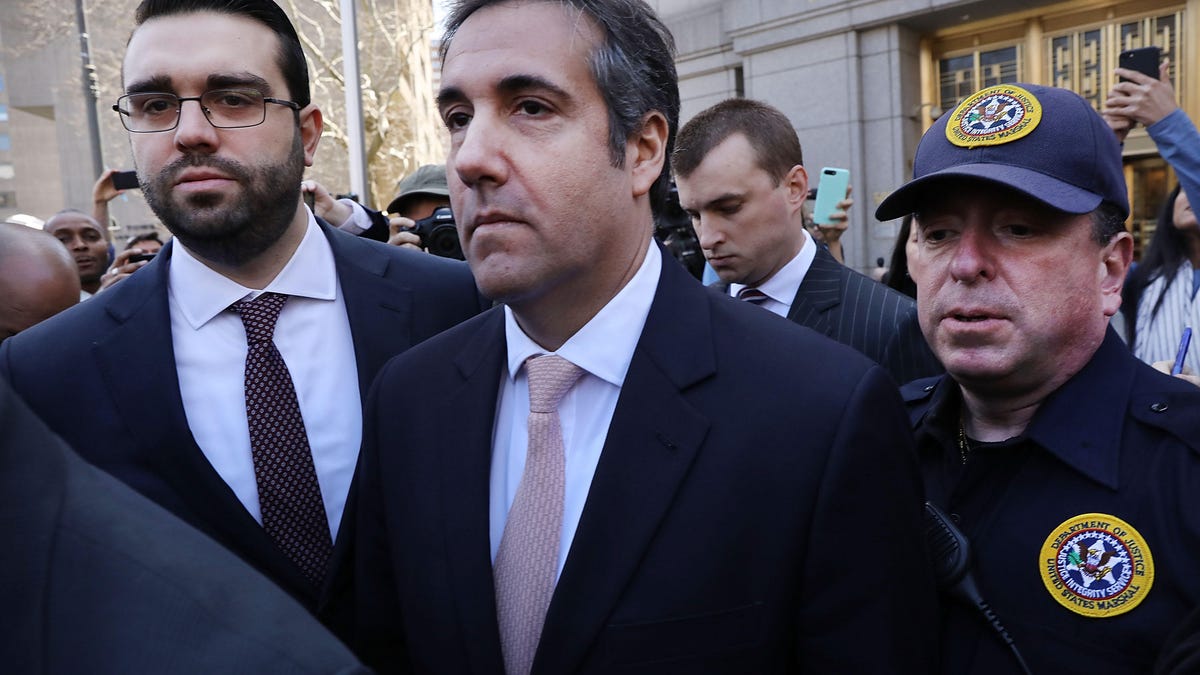AT&T reportedly hired Trump lawyer Michael Cohen for advice on Time Warner bid
What insights the longtime real estate attorney could offer on telecom mega-merger aren't clear.

Michael Cohen, longtime personal lawyer and confidante for President Donald Trump, leaves a New York federal court in April after asking the court to block Justice Department officials from reading documents and materials related to his Cohen's relationship with President Trump.
AT&T paid President Donald Trump's lawyer Michael Cohen $600,000 to advise the telecom giant on its proposed $85 billion acquisition of Time Warner , along with other issues pending before the federal government, The Washington Post reported Thursday.
Documents obtained by the Post showed the company turned to Cohen three days after Trump was elected, specifying that Cohen would provide the company with advice on its merger with Time Warner. It was unclear what insights Cohen, a longtime real estate attorney, would have been able to offer AT&T on a complicated telecommunications-entertainment merger, the Post pointed out.
Trump expressed opposition to the merger, which requires the approval of federal antitrust regulators, during the 2016 presidential campaign. His administration filed a lawsuit in November to block it, but the case has yet to be decided.
The US government argues that combining a telecom giant, which owns wireless and wired internet assets, with one of the premiere media properties in the world, would create too powerful a player in the media landscape. The government has urged AT&T to divest either DirecTV, its satellite pay TV service with more than 20 million subscribers, or Time Warner's Turner cable channels as a condition for approving the acquisition.
AT&T didn't immediately respond to a request for comment on the Post report, but CNN reported Thursday evening that a representative for the telecom giant confirmed it had paid Cohen's company Essential Consultants for "insights into understanding" the new administration.
Cohen's deals with AT&T emerged earlier this week through an executive summary shared on Twitter by Michael Avenatti, who is representing former porn star Stormy Daniels, whose real name is Stephanie Clifford. According to the document, AT&T made four payments of $50,000 each between Oct. 3 of last year and Jan. 3 to Essential Consultants, a Delaware firm that was reportedly created in October 2016 ahead of the US presidential election to pay Clifford.
According to a CNBC report Wednesday, AT&T may have paid Essential Consultants up to $600,000 as part of a consulting contract, three times the amount from a report that said AT&T had paid at least $200,000 to Essential.
AT&T confirmed the payments to CNET but didn't specify the amount. It also denied that Essential did any legal or lobbying work for the company.
"Essential Consulting was one of several firms we engaged in early 2017 to provide insights into understanding the new administration," a spokeswoman said in an email Tuesday.
In a memo AT&T sent to employees earlier this week, the company said that it had retained Cohen in early 2017 "to help us understand how the president and his administration might approach a wide range of policy issues important to the company, including regulatory reform at the FCC, corporate tax reform and antitrust enforcement."
The White House didn't immediately respond to a request for comment.
iHate: CNET looks at how intolerance is taking over the internet.
Tech Enabled: CNET chronicles tech's role in providing new kinds of accessibility.

